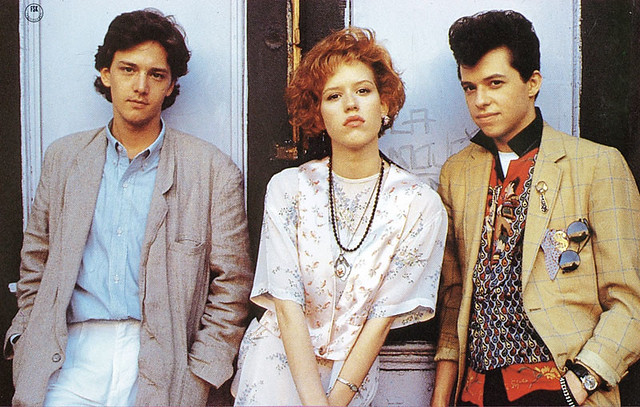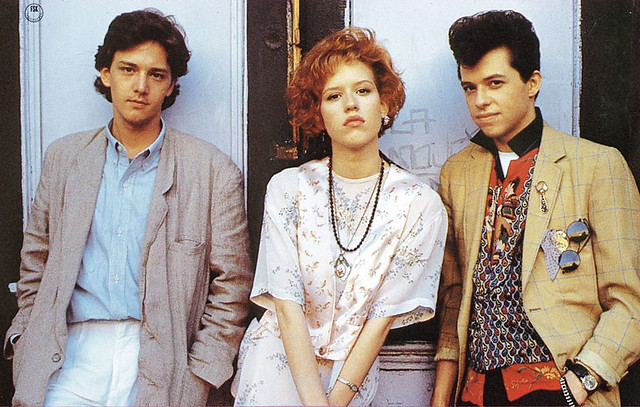
Blane, Andie, and Duckie of “Pretty in Pink” (Photo courtesy Paramount Pictures)
Editor’s Note: To mark the 30th anniversary of the movie, a special viewing of John Hughes’ “Pretty in Pink” screened nationwide on Sunday, Feb. 14. You can see it also on Wednesday, Feb. 17, in DC metro at AMC Hoffman Center 22 (206 Swamp Fox Rd., Alexandria, Va.), with showtimes at 2pm and 7pm. Tickets are available online. Parklife DC contributor Neal Keller caught the film and shared some thoughts with us in this essay.
A Valentine for Andie
Among the things I could appreciate without hesitation was the soundtrack of now-classic 80’s New Wave tunes in “Pretty in Pink.” There were some misgivings nonetheless. While the film’s music credits were definitely a draw for nascent hipsters like myself back then, I’ll confess that I never liked the New Order song that debuted on the soundtrack. I always thought “Shellshock” was New Order by the numbers, and a sign that they were getting ready to sell out. Already a strike against the film, before it even hit the theaters!
But let’s talk about the notion of “selling out.” It’s an entirely teenage accusation that probably shouldn’t survive into adulthood. Nevertheless, the accusation was thrown at the character of Allison (Ally Sheedy) in “The Breakfast Club.” Allison forsakes her proto goth girl soul for a date with a member of the wrestling team. Well, if submitting to a makeover for the sake of the jock in “The Breakfast Club” counts as a transgression, then threadbare Andie’s leap to the other side of the tracks for the sake of a preppie rich kid in “Pretty in Pink” must rate as a mortal SIN.
To be sure, it was the topic of conversation in the parking lot outside the cineplex back in 1986, especially for those of us of similarly modest means. And the debate continues to this day. The 30th anniversary screening of “Pretty in Pink” includes a featurette, where Producer Lauren Shuler Donner invokes the word — sin. Inevitably, someone would! (The featurette is well worth staying for, but more on it in a moment.)
“Pretty in Pink” is a romance. A love story. Ostensibly, it’s the tale of Andie (Molly Ringwald) and Blane (Andrew McCarthy) finding romance in each other’s arms, with a nod to the Cinderella fable. Rich kid Blane takes a liking to Andie, despite the fact that her family is of much more modest means. Both struggle with the implications of dating across classlines. A third character completes the conflicted love triangle, and provides an additional personification of the wealth divide.
It is through Jon Cryer’s similarly impoverished character, Duckie, that the outrage over Andie’s crossing of the classline is expressed. The story could have been about Andie finding love with Duckie instead of Blane, and it almost was. Test audiences who saw this version presented as the original ending rejected it, and the ending was reshot. John Hughes himself later said that he worried that the original ending sent the message that class divide can’t be overcome. In a featurette, the rerelease offers the audience the opportunity to consider this alternate ending — and to judge whether the pairing of Andie and Duckie would have worked or not. I know who I was pulling for 30 years ago, and it wasn’t preppie boy. But I think that even with Andie choosing Blane at the end, the story of Duckie’s unrequited love for Andie is crucial to the emotional resonance of the film. All the characters have choices to make, some for love and some for dignity.
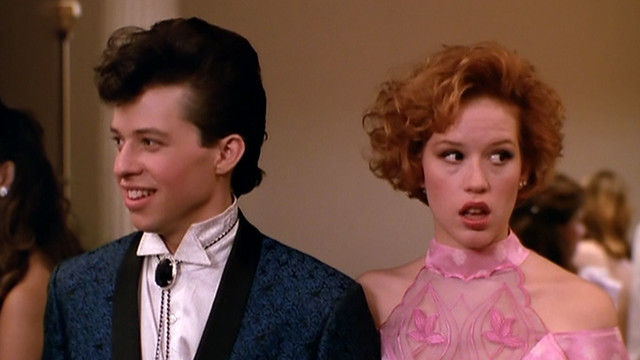
Duckie and Andie are fated to fulfill their destinies by the film’s infamous prom scene. (Photo courtesy Paramount Pictures)
As I stated last year in a similar review, I think “The Breakfast Club” is the essential John Hughes film. In a similar sense, I think “Pretty in Pink” is the essential Molly Ringwald film. She plays the central character, Andie Walsh, and the film’s examination of the role of wealth and class in the pursuit of companionship are expressed primarily through her.
Getting back to the notion of selling out, the division along economic lines is arguably the main conflict that the film seeks to address, and it does a remarkable job of doing so. What “The Breakfast Club” did for cliques, “Pretty in Pink” does for classism — and once again the genius of Hughes’ approach is to give us characters through which we can personally feel the tension of this conflict. If each of us ends up choosing sides with one of the characters, we are quite adeptly compelled by Hughes’ artful screenplay and Howard Deutch’s direction to see what’s going on within those on the “other side.” The universality and timelessness of the film derives from this gambit and the skill with which the team pulls it off.
Thus, 30 years later, the film is relevant to the conversation on wealth inequity that pervades our current national discourse. Additionally, as we think about relationships in 2016, we read about studies that show that differences in social/economic status are the greatest divider in the dating scene — more insurmountable than differences in ethnicity, religion, or even age — and we can’t help but see this reflected in the film.
As much as “Pretty in Pink” is seen as a chick flick, it doesn’t leave out the guys, and thus doesn’t suffer from a gender divide. The male characters are fully realized and fairly presented, and the guys in the audience shouldn’t be at a loss to relate to them. I wasn’t, and as it was with “The Breakfast Club,” the sensitive nerdy guy provided the avatar that allowed me to be in the story. Oh, adoring Duckie, with your thrift-store threads, your uncool footwear, and your clumsy come-ons, why won’t your similarly attired it-girl warm up to you? She shares your edgy musical tastes and circular lenses, not to mention the same wrong-side-of-the-tracks zip code. Duckie will come to understand why it’s not meant to be by the film’s conclusion.
Sadly, it takes many of us a whole lot longer to figure it out in our real lives. Yes, Duckman, you can get a laugh (or a smirk) from her when you’re not trying waaay too hard. But wise up. As much as they like to hang with the jesters, they rarely stay with them. And PAY ATTENTION as she drives you home, taking a detour through the finer neighborhoods. THIS is what this girl romanticizes and aspires to. She wants to ESCAPE the little house nestled in the shadow of the exit ramp. AND, she (quote) “doesn’t want to work in a record store her whole life.” (Not to worry, Andie, it turns out our generation is destined to outlive record stores after all!) She wants Paris, even if she has to get there herself, with or WITHOUT the help of the rich kid from across town. When he does show up, though, she’ll value the fact that he knows his way around the Champs-Élysées and that he’ll be comfortable sharing a fine wine in a nice restaurant without the need to mock the experience out of insecurity. Face it, Duckman, people trade up, not down. And no force of personality or cool record collection trumps that. She’s not dreaming of the eventual Soho efficiency that lies in your future, even if it IS cool to hold band practice in the utility room.
It’s a demoralizing experience to watch the folly of Duckie’s increasingly desperate attempts, especially with the benefit of middle-aged hindsight (pitching yourself to her father? Really?). For any other disheartened sensitive nerds out there, saddened by the failure of the Duckman, I recommend a dose of “Gregory’s Girl” to restore the self-image. Another classic ‘80s teen flick, it serves to remind us that women are multidimensional and that they don’t all want the same thing. Unfortunately for Duckie, he’s made the classic mistake of putting all his eggs in one basket. Gregory overcomes Duckie’s tunnel vision by being open, and with (inspiringly) a little help from the girls around him, who have detected some promise in him.
Not every viewer of the film will end up obsessing over the fate of the nerd, of course. Most will be focused on the female lead, and whether she will fall for the rich kid at the expense of her alterna-chick credibility. So is Andie, the main character in this girl-oriented teen romance, guilty of selling out? I have to state emphatically that she is not. She sticks to her ideals, and even calls out preppie boy when she suspects he’s ashamed to be seen with her. She declares that she’s not going to let anyone shit on her, and she DOESN’T.
Andie deserves to be lauded as a feminist icon, right next to Sigourney Weaver’s Ripley. Every bit as important as the class struggle depicted here is the film’s endorsement of the idea that women have every right to make their own choices about who to love, without needing to justify that choice to anyone. As any strong woman can attest, it’s a courageous act to defy the expectations of the patriarchy and submit to her true romantic yearnings. Especially when the alternative is being guilt’ed into staying with her childhood friend, for the sake of his own lack of courage.
Thus, it is a struggle for others around Andie to accept her choices, just as she struggles with accepting her own station in life. But even there, it’s more of a challenge for her father to find the strength to live within his circumstances than it is for her. In any case, Andie is determined to follow her heart, and the heart wants what it wants. It’s really quite oblivious to rational arguments about compatibility and what’s reasonable. Reason’s the domain of that eternally second-rate negotiator we call the mind. The heart can be quieted, but it can’t be persuaded to see reason, try as we might. As anyone who’s ever pulled out an old photo and felt that tinge knows, some marks are indelible. It doesn’t take much for Blane to leave such a mark on Andie’s heart, and once it’s there, his absence creates a void that, inexplicably, wasn’t there even one day before. How else can one explain her willingness to endure such a terrible first date and still come away from it with butterflies in her stomach? Is she to succumb to fears of selling out her peer group over selling out her heart’s true desire?
I might think she was a sell-out if I really thought it was about Blane’s wealth, but I don’t. I think it’s about his confidence, an intoxicating aphrodisiac in the hands of all who possess it. He doesn’t spend eight years working up the nerve to express his feelings. Also, it is about his ability to see something in her, and having the courage to reach out to grasp it. She knows what he says is true. He has as much to lose as she does.
Which brings us to the ultimate gatekeepers at the threshold of romance: our friends. Sure, there’s family too, but it’s telling that the only parent depicted in the film is Andie’s father, and he encourages her. The peer groups have other ideas, though. When an actual physical fight occurs in the film, it’s between the best friends of the main characters; this is how invested they are in what Andie and Blane’s courtship represents. I honestly think you could remove the aspect of wealth inequity from the story, replace it with another source of peer group conflict, and you’d have the same movie.
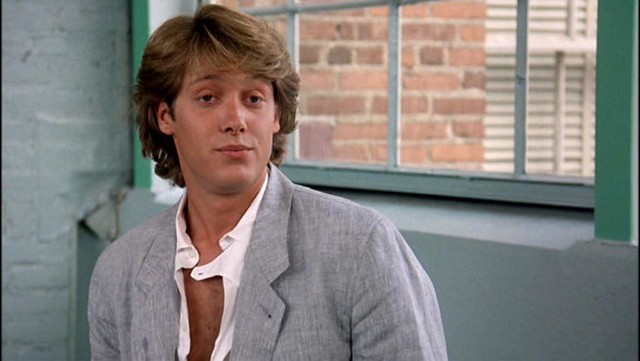
Hey, Steff might be a villain but he’s got great taste in clothes a la Duran Duran – editor. (Photo courtesy Paramount Pictures)
But Blane’s best friend in the film, Steff (James Spader in what is perhaps the most convincing supporting role) tells him point blank that their friendship is in jeopardy if he proceeds with courting Andie. And Steff’s had more time to mull it over. The person who is the last to find out about the couple’s budding romance knows exactly how he feels about Andie’s choice, without any need for contemplation. It’s Duckie.
For all of the lovelorn and forsaken souls in the audience, the first truly painful moment in the story happens at the record store when Duckie is blindsided by the realization that Andie is waiting on a date with another guy. He walks right into it, blithely unaware, without the benefit of so much as a cryptic Facebook post on her page to tip him off. I know with absolute clarity what his character is feeling at that moment, and the scene brings it back to me as if I was standing in his scuffed up wingtips. His reaction is quite visceral, and he unloads on Andie without hesitation. It’s unfair of him, but it’s one of the most realistic moments in a film rife with them.
What every Duckie out there has to realize that they don’t get to make other people’s choices for them. It’s natural to react to the feelings of resentment and disenfranchisement presented in the film with anger. The more humanizing realization that has to come next is the realization that we’ve all been on both sides of this problem at some point or another. We have been the one who loved the disinterested, and disinterested in the one who loved. Unfortunately, Cupid’s armament suffers from a painfully slow rate of fire, and rarely scores two targets quickly enough to put them together. The next bitterly painful moment in the film is when Andie has to reveal to her friend Iona (Annie Potts) that our hero too has been rejected. Her feelings of hurt and humiliation are palpable. Would Duckie care if he knew, given his stated refusal to be there for her when her heart got “splattered all hell?” Would he recognize that it’s simply, brutally, the same hurt?
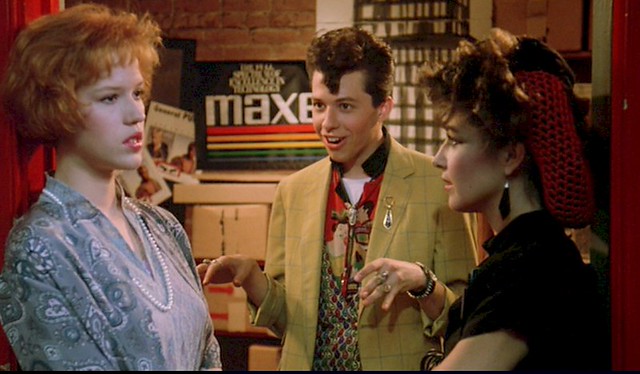
Andie doesn’t mean to hurt her friend Duckie. (Photo courtesy Paramount Pictures)
I once entered into a debate with a love of mine. She said that there was no love without trust. I offered that there was no love without respect. My suggestion was not given to counter hers, as I agreed with her contention. However, she rejected mine. I think she mistakenly interpreted “respect” to mean “obedience,” a condition that she rightfully reviled. The discussion deteriorated before I could clarify that this was not what I meant at all. Had I the opportunity to explain further, I would have expressed my belief that true respect has nothing to do with subservience (or fear, for that matter). I also would have added that “respect” goes much further than being something that is received from another. For love to work, it has to be something one has for one’s self.
Jon Cryer’s character discovers this by the time the film concludes. Inspired in part by this revisit to “Pretty in Pink,” and in honor of my own hard-won maturity, I’m adding a new word to this lexicon of love: Were I too enter into the aforementioned debate again, I would suggest to my lost inamorata that there is no love without “acceptance” — acceptance of another’s free will, of the validity of choices. To appreciate our own right to choose as we feel, we must likewise respect the same right for others — even when we are not the chosen.
Duckie realizes this at the end, and it is the transformative moment for his character. Yes, the original ending of the film was changed, allegedly to satisfy the desire of test audiences who wanted to see Andie with Blane. It’s not the ending I was secretly hoping for when I first saw the film, but I am now realizing that I’m grateful for the ending I got. For another reason, though. It is because it allows Duckie’s character, the character that I related to, to be thusly transformative. And it’s a guiding transformation, anticipating one I would one day experience myself. It should be of guidance to the eternally jilted stalky/trolling dudes of the social media era as well. Duckie feels better for having grown inside, for his difficult capitulation to adulthood. He still loves Andie. Of course he does. From afar maybe, as a friend, sure. But as an adult. With humility, compassion, and appreciation for the shared burden that love places on all of us.
Among the qualities Duckie adores in Andie is her independence, even as she charts a course that doesn’t include him. It’s a debilitating conundrum for the intellectual romantic to face: The fierce independence that so compels his longing is ultimately what obviates it. Just as much of a painful irony is when your crush expresses an appreciation for you, even as she seeks another. Although she declines to pursue it, Andie acknowledges that she sees what an incredible person Duckie is, and tells him so (with the caveat that she hopes someone else will also, and will follow through in her stead).
Watching the film again, I also took note of a connection linking “Pretty in Pink’s” Duckie and “The Breakfast Club’s” Allison — the shoes. Whether or not footwear was an intentional metaphor for John Hughes, I’m taking it as mine. Duckie reveals at the end that the beat-up shoes he wore to the prom were the same ones that carried him through the film, and thus were symbolic of his solidarity with the outsiders. Now, to demonstrate his commitment to his ideals, he should take inspiration from Andie and her eagerness to proclaim “they” didn’t “break her.” Andie is saved from being a sell-out by having the courage to be honest with herself and those around her. Duckie should follow in her footsteps, and continue to seek in another the depth and independence he worshipped in Andie. What better way to express his love for Andie than to demonstrate that he learned something from her?
Andie witnesses the emerging identity that Duckie is crafting for his true love to see. He hopes and believes that this self would be validated and cultivated in the light of her gaze. Would another even see it, would she search beyond the surface to discover it, and importantly would she… accept it? What if a consolation date doesn’t? Does he suppress this persona, does he tuck it away, just for the sake of not having to go home alone? If he does, then perhaps we have found the actual sell-out in the John Hughes canon. Take heed, Duckman: It is better to walk alone in truth than to dwell inside an artifice for the sake of the company.
I have confidence that he won’t do that, though, and thus he also escapes being accused of being a sell-out. That’s right — I’m issuing a pass for both characters, just as I did for Allison.
I’m letting New Order off the hook for “Shellshock” too. After all, the most important scenes in the film are punctuated with other music by the band, culminating in the ingenious placement of “Thieves Like Us” behind the scene in which Andie is shown regaining her fighting spirit through her creativity. They don’t include the words, but go back and listen to the song again. It’s a well-crafted indictment of our generation’s cynicism over the notion of romance.
Parklife DC contributor Neal Keller is a professional sound engineer at Omega Studios as well as DJ of the long-running ’80s Dance Party at Tropicalia! For more on Neal, visit http://www.80sdanceparty.com.
